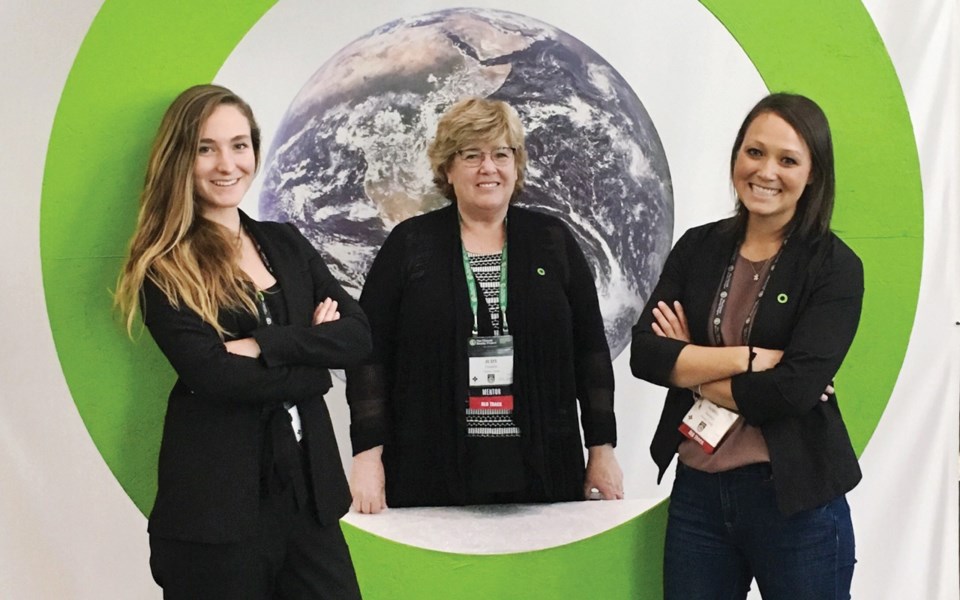When discussing climate change, it's difficult to picture a bigger champion for the cause than former U.S. Vice President and Nobel Laureate Al Gore.
Since leaving political life, he's made it his mission to educate citizens about global warming, first through a slideshow presentation he's delivered thousands of times, and later through An Inconvenient Truth, the Academy Award-winning documentary based on that presentation. Currently, he serves as the chairman of the board of directors for The Climate Reality Project, a non-profit striving to educate and promote advocacy.
Now, thanks to that non-profit, one Whistler resident is hoping to bring Gore's message back to her community.
Taniell Hamilton, along with former Whistler resident Anitra Paris, are two of 90 Canadians who Gore trained to become "Climate Reality Leaders" during the Climate Reality leadership training conference held from Aug. 28 to 30 in Los Angeles. Over 2,200 participants from about 90 countries attended the training program, Hamilton said.
"It's all about educating people about the climate crisis and then empowering them to go out into their communities and kind of be little, mini-catalysts for change.
"They focus a lot on awareness and education as a tool to motivate people, and then basically this leadership training focuses on bringing everyone together and then giving them the tools and resources they need, as well as helping them develop the network they need to succeed in creating change."
Paris, who now works in the clean and renewable energy field in Vancouver, called it "an amazing experience."
Though she's familiar with the topic after studying natural resource conservation at the University of British Columbia and working on the Resort Municipality of Whistler's Bear Advisory Committee, "to be able to hear him speak and the way he crafts his conversations is very admirable. I think he really effectively communicates about climate change without being too doom and gloom, but still being about positive action."
Hamilton, who holds a degree in sustainability studies and works as a senior environmental coordinator for sustainability programs at Whistler Blackcomb, said she was most drawn to the opportunity to network and be inspired by what other people in her field are doing.
"I feel like it's super important to surround yourself with other people that are motivated and really passionate about making change and working together to work on solutions for all of the different environmental issues we're facing," she said
Though the crowd may have been likeminded, it was also diverse: the training program is free for all successful applicants to attend, with participants responsible for covering their travel and accommodation costs.
"Because of that, you get such a variety of people," Paris said.
Organizers are "just looking for people who are keen," Hamilton added. "You have everyone from top executives there to high-school students."
There was also a sizeable crowd of "really passionate" seniors in attendance, Paris added. "They'd come up and say, 'Yeah, I'm going to be retiring so I know I'll have some extra time and I really believe in the cause.' It was cool that there was such a range in generations."
And while travelling by plane to Los Angeles might seem counterproductive to the goal of reducing greenhouse gas emissions, "They carbon offset everyone's air travel," Paris explained. Organizers calculate the carbon emitted by each participant's travel, and buy an equivalent carbon credit—for example, funding a reforestation project or investing in clean energy—to make the trip carbon neutral.
Hamilton was well acquainted with much of the material discussed at the conference, but "there was a ton of statistics and facts that were thrown out that were super eye-opening," she said, referencing one speaker's focus on seeking change strategically, which included identifying the four biggest sectors for emissions and narrowing down the field of decisions-makers to less than 100 individuals who have the most power to affect change.
"That was probably the most empowering panel, was listening to him talk about how we have to strategically attack climate change, and where to place our resources and time and energy ... He used the word 'triage,' which I thought was super interesting," Hamilton recalled.
In addition to participating in training sessions, attendees also commit to delivering free presentations on climate change to their communities upon their return home.
"I'm very fortunate because I luckily get to be involved in a lot of the training that happens at Whistler Blackcomb. I'm definitely hoping to weave this into my regular job ... but also, on the side, apart from my Whistler Blackcomb job, I really want to get more involved with our community, so finding different avenues where I can give this presentation," Hamilton said. (Any businesses or programs interested in hosting a free presentation can contact Hamilton at taniell.hamilton@gmail.com).
"I walked away from the conference with more hope than I went into it with ... The first part of the conference is a little daunting, and you get to the solutions and what's happening around the world, and you realize, 'Wow, things are moving quickly.' Things are changing and it's very inspiring to hear how fast that's going."




